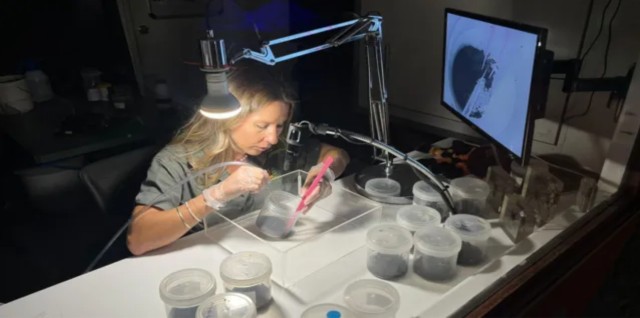
California Assemblymember Buffy Wicks, a Democrat and chair of the Assembly Appropriations Committee, speaks to reporters on Thursday, May 16, 2024, in Sacramento, California. The committee decided the fate of hundreds of bills on Thursday. (AP Photo/Adam Beam)
SACRAMENTO, Calif. (AP) — Facing a substantial budget deficit, California lawmakers are making tough decisions on which of the more than 1,000 proposed bills will move forward this year. On Thursday, many bills were halted from advancing to the Senate and Assembly floors via the suspense file process. This procedure involves lawmakers on two committees deciding, without explanation, which bills will progress and which will not.
Typically, around 75% of the bills pass through this process. However, this year, veteran lobbyist Chris Micheli noted an unusual occurrence: the Assembly Appropriations Committee approved only about 65% of the bills on its suspense file, leaving over 230 bills without a path forward.
Democratic Assemblymember Buffy Wicks, the committee chair, acknowledged the state's budget difficulties, emphasizing the necessity to balance the budget. This situation led to the holding of a bill aimed at creating a government-funded universal health care system, which Wicks had previously supported.
“We must balance the budget here in California,” Wicks said. "We cannot incur debt, so we have to be very careful with our budget decisions.”
Across both houses, numerous proposals were held back. Here are some key highlights:
Reparations:
Proponents of reparations for Black Californians saw mixed results. The state Assembly passed a state apology for the legacy of slavery, and the Senate Appropriations Committee advanced several proposals to address harms against descendants of enslaved people. Key proposals that moved forward include establishing an agency to administer reparations programs, compensating Black families for land unjustly taken through eminent domain, and creating a state fund for reparations programs. However, bills offering property tax and financial assistance to descendants of enslaved people were held due to the state’s budget constraints. State Sen. Steven Bradford, who authored the bills, acknowledged the financial challenges and noted that this would be a multiyear effort.
Psychedelic Therapy:
A bill that would have allowed adults 21 and older to use psychedelic mushrooms under professional supervision was stopped by the Senate committee. This bipartisan bill followed Democratic Gov. Gavin Newsom’s veto of previous legislation that aimed to decriminalize the possession and use of several plant-based hallucinogens. Supporters, including veterans and first responders, argued that the bill would have shifted the response to mental health crises away from criminalization. However, opponents felt the bill was too broad and lacked sufficient medical oversight.
Electric Bill Charges:
A bill to repeal a newly approved fixed charge on Californians’ utility bills in 2028 did not advance. State regulators had approved a $24.15 monthly charge, with the goal of reducing electricity usage costs. People who use a lot of energy, such as those cooling homes or charging electric cars, would benefit from lower costs, while those using less energy, like solar customers, could see increased charges. The bill aimed to replace this charge with one not exceeding $10 for most residents.
Workers’ Rights to Disconnect:
A bill that would have granted California workers the right to disengage from work-related emails and texts outside of work hours was also shelved. Modeled after European policies, this bill would have made California the first U.S. state to implement such a measure. Proponents argued that workers need clear boundaries between work and home life. However, opponents, including the California Chamber of Commerce, claimed the bill was too vague and would hinder business operations.
In summary, California lawmakers are prioritizing budget constraints in deciding which bills to advance, impacting a wide range of issues from reparations and psychedelic therapy to utility charges and workers’ rights.















